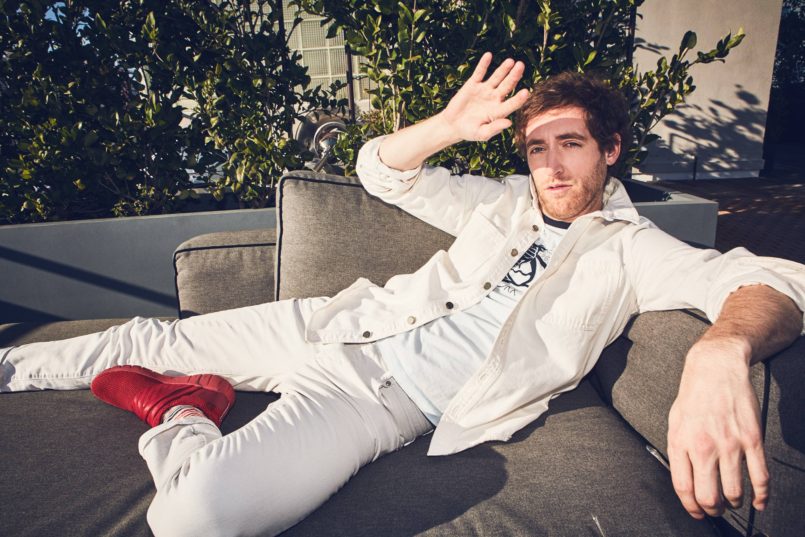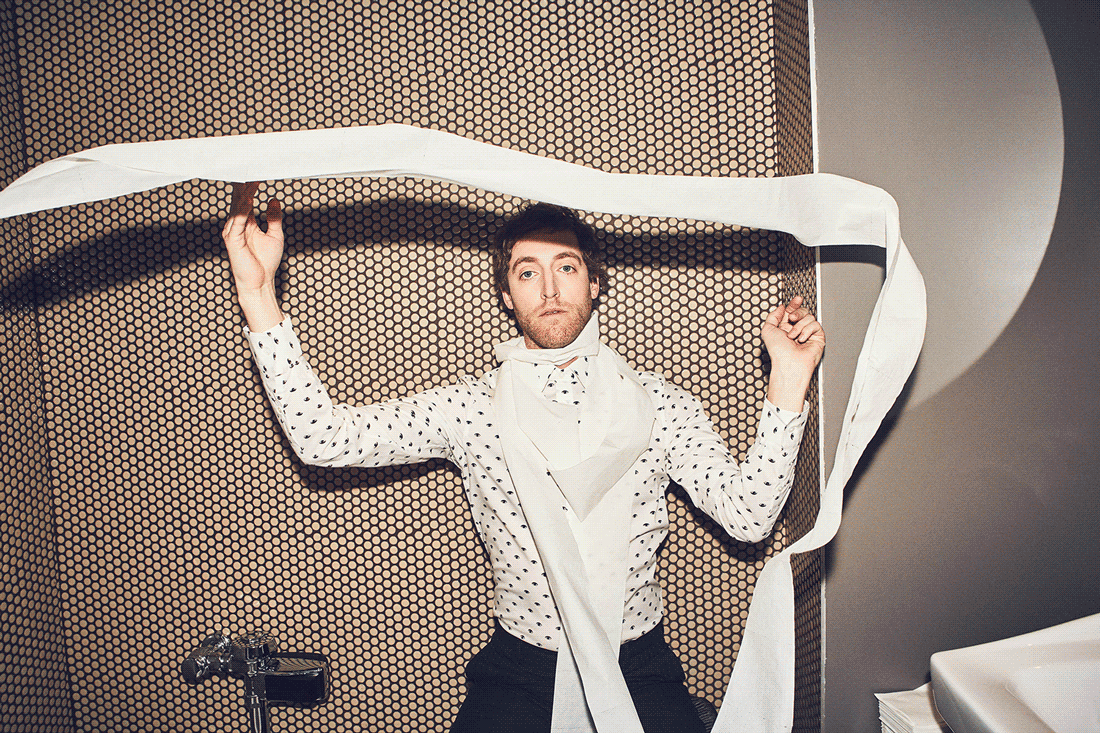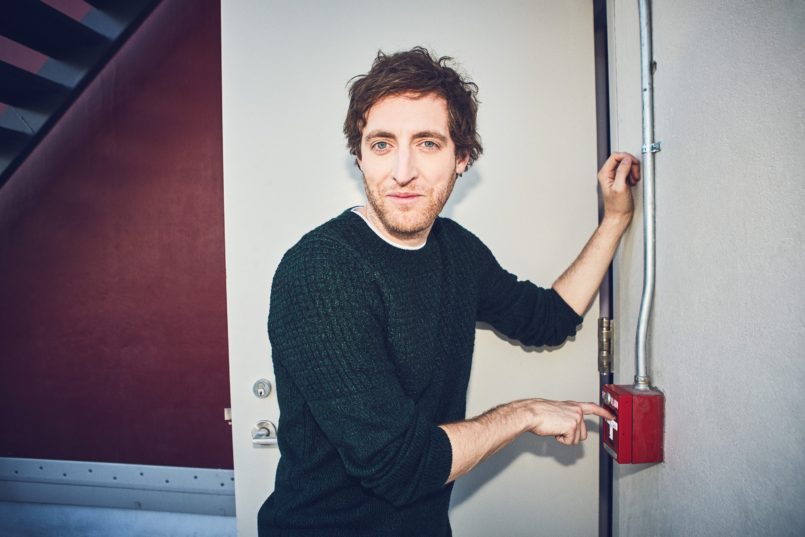Tell a sensitive grade schooler who’s teased every day that bullying gets better over time, and it’s likely to be small consolation at best. Tell that same kid that sold-out crowds will one day laugh at stories of him asking a crush out eight times in a single year, and he’s likely to have a full-on breakdown.
And yet, years down a road that will take him from the small-town woodlands of British Columbia to the sun-baked overstimulation of California, it will be that same kid telling those stories before an audience of fellow geeks at Largo. He’ll have the first and the last laugh, because he’ll set the tone and own it. “Pretty much onstage therapy,” he’ll reflect on his Instagram.
“I’m potentially your nerdiest subject,” Thomas Middleditch remarks to the photography crew as he settles into a couch under the lights of a Hollywood office six floors above Sunset Boulevard.
 “And the best one,” offers photographer Koury Angelo as he sets up.
“And the best one,” offers photographer Koury Angelo as he sets up.
“That is undeniable. That was never in contention. No need to reaffirm that,” Middleditch responds, the yin and yang of self-deprecation and self-confidence that defines both his presence and his comedy marking his speech. Fast talk and manic connections, casual nonsense and candid concerns, leaning in and out of characters and accents to make a point or mock his own thoughts: a lot of comics speak in a stream of consciousness, but Middleditch’s consciousness feels more like whitewater rapids, with a wide, unguarded smile as the raft.
If an hour of following Middleditch’s mind brings a sense of twisting, turning travel, it’s simply a condensed snapshot of what his life has granted him. He was born and raised in Nelson, British Columbia, where his parents settled after emigrating from England. “I was very fortunate—if I was to be raised in any small town in rural Canada—to be raised in Nelson, where there’s a vibrant arts community,” he says. “I was able to get involved not only in school theater, but [also] in community theater. That was the saving grace for me, because I wasn’t a hockey player, or an aspiring logger. I wasn’t, like, Brody Brylerson, snowboarder-extreme-guy.”
At this, Middleditch strikes a pose and enters into what one might call “character parentheses.” “Although I do know how to shred. On skis. A gentleman’s sport!” He shifts gears again, smiling shyly: “Make sure if I slip into voices you say it in parentheses or something.” Duly noted.[note]Brody Brylerson: bristling with the athletic bravado of an ’80s teen-movie villain you love to hate.[/note]
 Middleditch put up with “years of being teased and ostracized” during grade school. “I was kind of the weirdo kid: very emotional, very easy to get riled up. Very solo,” he says. As with many young geeks, a spotlight cut through the darkness and illuminated a path. “In eighth grade my drama teacher put me in a play and that helped me find my calling.”
Middleditch put up with “years of being teased and ostracized” during grade school. “I was kind of the weirdo kid: very emotional, very easy to get riled up. Very solo,” he says. As with many young geeks, a spotlight cut through the darkness and illuminated a path. “In eighth grade my drama teacher put me in a play and that helped me find my calling.”
“I’ll fall on my face to make you laugh if it means you not pushing me on my face to make you laugh.”
The play I’m a Fool—which is actually an adaptation of a Sherwood Anderson short story—as summarized by its breakout star: “It was about a kid—a young whippersnapper—in the 1910s or ’20s. They’re at the racetrack all summer, and—oh, boy!—he met a girl he really liked, but he lost her, and ‘I’m a fool!’”[note]The I’m a Fool Kid: a Newsies-style old-timey Atlantic hustler.[/note] Though the play itself may be slightly less relevant than, say, a show about the pitfalls of start-up culture, the memories remain vivid and powerful—particularly a bit he created onstage where he’d stick his head through the curtain, breaking the fourth wall to give the audience a terrified reaction. “That feeling, that response… That exchange was awesome: I found something I’m good at. For a while it was just, ‘I guess I’m good at crying a lot?’”
And so, a comic was born. “Within a year,” he recalls, “the kids who were making fun of me were my friends because I was now the class clown.” And from middle school’s casual cruelty came a community of fellow geeks. “As soon as you’re past that, you start finding your own people and testing who you are.”
His mission statement going into his life’s testing phase: “I’ll fall on my face to make you laugh if it means you not pushing me on my face to make you laugh.”
![]()
The region known as Silicon Valley has become synonymous with innovation and risk-taking, so it’s fitting that the eponymous HBO series set in the tech hotbed would feature a character we’ve never quite seen before.
Middleditch’s Richard Hendricks might be the shakiest straight man in history, his nervousness anything but a polished persona meant to carry a narrative or deliver jokes. As his fledgling company is constantly threatened under escalating stress factors, his social anxiety reaches heights that are debilitating; he moves through the show with a stammering, urgent uncertainty that comes off as more real—and relatable—than rehearsed.
https://www.youtube.com/watch?v=mydFes629og
“Richard is very tightly wound,” Middleditch explains. “He’s on his heels backtracking in his nervousness, slinking out of something he’s said or done. He’s got flaws, and one ranking very high on the list is pride. So he gets his ego wounded and he can’t let something go. Or the tension is too great and he can’t handle it all.”
Middleditch remains blown away by the opportunity, the success, and the unlikely outcome that he’s now recognized for a style that he rarely brings to his live comedy. “I’m usually the super-weird, absurd person. Literally walking on like, ‘Hi, I’m a Talking Pile of Shit!’[note]The Talking Pile of Shit: extremely upbeat and aggressively friendly.[/note] That’s the standard. And it’s not that Richard isn’t weird, but he’s more subdued. I totally love doing that, but it came out of left field.”
The rest of the Silicon Valley crew is made up of standups and character actors with geek cred to spare: Zach Woods is Jared Dunn, the “mother hen,” as Middleditch puts it; T. J. Miller plays Erlich Bachman, the entrepreneur who constantly flirts with bankruptcy both moral and financial; Freaks and Geeks fan-favorite Martin Starr is all grown up as deadpan engineer Bertram Gilfoyle; and Kumail Nanjiani, Middleditch’s longtime friend, is engineer Dinesh Chugtai.
“It feels weird that it’s a rarity—a comedy show with actors who are [also] current working comedians,” Middleditch says. “I’m not saying it’s a requirement. But when you’re talking about comedy, there’s a technical aspect. At a certain point it’s like, ‘Cut the bullshit about how everyone feels in the scene. What do we need to hit? How can we punch it up? Let me try five alts so I can maybe slide in a funnier joke.’”
 He’s been lauded for his convincing use of jargon and for the depth of his characterization and physicality. (“It’s a bit like a nerdy medical drama. ‘I need a hundred CCs of gigabytes!’”[note]The Medical Drama Nerd: urgent and emphatic, but perhaps too nasally to take seriously.[/note]) Though Middleditch is no tech slouch—stemming from his lifelong love of gaming and a background of hosting LAN parties—he still defers to the experts. “The show has a ton of consultants. We mine a lot of people from the Valley for stories and solutions. Even in season one, at the end, when they’re talking about jacking off everyone in the room?”—Silicon Valley is probably the only show on television to build a major plot point around theoretical bulk handjobs—“We had a Stanford professor go through and check all that math to make sure it’s plausible and real. Because the Venn diagram of people who watch our show and people who have access to the Internet is…nearly one circle.”
He’s been lauded for his convincing use of jargon and for the depth of his characterization and physicality. (“It’s a bit like a nerdy medical drama. ‘I need a hundred CCs of gigabytes!’”[note]The Medical Drama Nerd: urgent and emphatic, but perhaps too nasally to take seriously.[/note]) Though Middleditch is no tech slouch—stemming from his lifelong love of gaming and a background of hosting LAN parties—he still defers to the experts. “The show has a ton of consultants. We mine a lot of people from the Valley for stories and solutions. Even in season one, at the end, when they’re talking about jacking off everyone in the room?”—Silicon Valley is probably the only show on television to build a major plot point around theoretical bulk handjobs—“We had a Stanford professor go through and check all that math to make sure it’s plausible and real. Because the Venn diagram of people who watch our show and people who have access to the Internet is…nearly one circle.”
“It’s a constant sort of, ‘Eh? Don’t you think this is fun?’ And then they punch you in the nuts.”
After three seasons of falling on his face to make us laugh, Middleditch received an Emmy nomination for Outstanding Lead Actor in a Comedy Series in 2016, becoming just what he was nominated for playing: a fresh, uneasy addition to a world of giant competitors. (The award went to Jeffrey Tambor for Transparent.) “You spend all year not thinking about it, and then you get thrust into thinking about it,” he says of the experience. “You look at the other nominees and you’re like, ‘There’s no hope.’ But then people are like, ‘Maybe! Maybe you’re the dark horse!’ And now you’re emotionally invested. It’s such a roller coaster. It’s a constant sort of, ‘Eh? Don’t you think this is fun?’ And then they punch you in the nuts. Like, ‘Isn’t it fun? On to the next little obstacle you have to navigate!’”[note]The Hollywood Industry Type: smiling a little too wide as he flails, pops your personal bubble, and assaults your genitals.[/note]
Richard’s struggles in season four are familiar to anyone who’s watched more than a few minutes of the show. “His whole promise in the first episode was to do this differently. He’s [still] up against the big players. How long can you survive if you’re just playing nice the whole time?”
So Middleditch once again uses humor to defeat bullies, albeit on a scripted level, with Stanford-approved dick jokes and award-season bona fides. But in a twist worthy of his lightning-fast free associations, he now finds himself facing real-world bullies on a truly absurd scale, thanks to the combination of newfound fame and the access granted by actual Silicon Valley tech. The United States is a young enough nation to be the middle-schoolers of the globe, after all.
 After working through visa issues for years and fighting to immigrate to the States, Middleditch has occasionally run afoul of the alt-right in America, often via Twitter, but also in person. As Nanjiani recently tweeted, the pair were accosted at a Los Angeles bar. “There are plenty of venomous terms being thrown around,” Middleditch says. “‘Cuck,’ ‘snowflake,’ ‘liberal tears,’ ‘libtard.’ They can’t wait to bring up a victory over you, regardless of what that means. People are like, ‘What’s wrong with bullying? It makes a man outta ya!’ I thought we were past that!”
After working through visa issues for years and fighting to immigrate to the States, Middleditch has occasionally run afoul of the alt-right in America, often via Twitter, but also in person. As Nanjiani recently tweeted, the pair were accosted at a Los Angeles bar. “There are plenty of venomous terms being thrown around,” Middleditch says. “‘Cuck,’ ‘snowflake,’ ‘liberal tears,’ ‘libtard.’ They can’t wait to bring up a victory over you, regardless of what that means. People are like, ‘What’s wrong with bullying? It makes a man outta ya!’ I thought we were past that!”
But Middleditch didn’t find his voice just to shelve it. “If we’re being truly honest with ourselves, you’ll see I’m not 100 percent kind all the time. Sometimes my response is, ‘I don’t give a shit.’ I certainly don’t hold my tongue on thoughts about Ronald Drumpf.” (He sinks into his couch for an aside. “God, I bet he smells like mold.”) Meanwhile, his method of undermining bullying with humor still holds strong: “My go-to response on Twitter is, ‘Hey man, you seem chill! Let’s hang out!’”
![]()
As a self-made creative and a self-professed nerd, Thomas Middleditch is confident in who he is. Though he cites fellow Canadian expatriates Jim Carrey and Mike Myers as influences, and particularly loves FX’s Baskets, he admits that from what he wants to take in, “such a thin slice of that pie is comedy.” Still, his geek flags are many and wave proudly: He’s a diehard action movie nut, an armchair military historian with a recently acquired pilot’s license (“I’m now consummating my love affair with aviation”), a tireless gamer, and an Elliott Smith super-fan. He’s also a devoted environmentalist; in a town bustling on the backs of those Silicon Valley conveniences Uber and Lyft, Middleditch rides his bike to the photo shoot and enters with helmet-hair held high.
Having learned to make who he is an asset, he’s turned even the loneliest years of his life into sight gags to share with fellow comedy nerds.
“I think any good comedic character has to have a hidden sadness—some sort of lingering deep depression or something that can dismantle them at any moment,” he says. “What’s funny about someone who’s super confident and invincible? Unless they’re secretly not confident and totally…vincible.” He laughs. “That’s a good standup title. Thomas Middleditch: Extremely Vincible!”
Good point, but you’d think working on a show about the tech industry would teach you the importance of protecting a good idea. You never know who might steal—er, get inspired by it. FL







